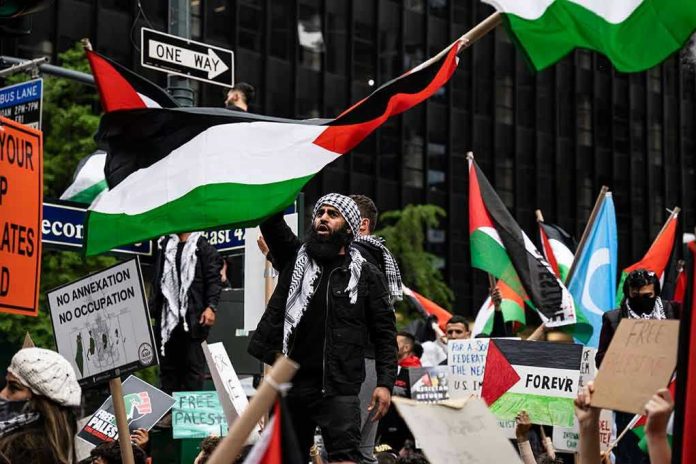
France’s latest crackdown on political flag displays exposes how global conflicts are now shaping the rules on freedom of expression and national neutrality, raising alarm for anyone who values local autonomy and constitutional principles.
Story Snapshot
- France’s interior ministry ordered regional prefects to block Palestinian flag displays on public buildings next week.
- The directive coincides with France’s formal recognition of Palestinian statehood at the UN and the Jewish holiday Rosh Hashanah.
- Mayors defying the order face legal action; Socialist leaders urge symbolic flag displays in protest.
- The controversy highlights growing tension between local political expression and national policy neutrality.
French Government Moves to Restrict Political Symbolism on Public Buildings
France’s interior ministry issued a directive instructing regional prefects to prevent the display of Palestinian flags on town halls and other public buildings. The timing is significant, as Paris prepares to formally recognize the Palestinian state at the United Nations General Assembly. The ministry’s official rationale rests on the principle of administrative neutrality: public institutions must not be seen as taking sides in international conflicts. Mayors who defy the order risk legal action, with cases sent to administrative courts for review.
This move reflects France’s ongoing struggle to balance freedom of expression with its tradition of secularism, known as *laïcité*. The Israeli-Palestinian conflict has long been a flashpoint in French politics, given the country’s sizable Jewish and Muslim populations. The directive comes at a sensitive diplomatic moment, as France becomes one of the largest European powers to formally recognize Palestinian statehood. The order’s timing, coinciding with the Jewish holiday of Rosh Hashanah, adds a layer of complexity, raising concerns that government policy may inadvertently inflame community tensions.
Political and Community Leaders Respond to the Directive
Socialist leader Olivier Faure has urged mayors to display the Palestinian flag as a symbol of solidarity, directly challenging the interior ministry’s stance. This call has intensified political debate, with local officials caught between expressing support for Palestine and complying with national policy. President Emmanuel Macron, meanwhile, has framed the recognition of Palestine as a strategic move to isolate Hamas, not to support it. Israel’s government responded sharply, with Prime Minister Netanyahu accusing Macron of appeasement and warning of diplomatic fallout. Within France, Jewish and Muslim communities are closely watching developments, concerned about the impact on public order and intercommunal relations.
Prefects are monitoring public buildings, and legal challenges are expected if mayors proceed with flag displays. The situation has already sparked public demonstrations and could lead to administrative court cases that set new precedents for political expression in public institutions.
Impact on French Policy, Society, and International Relations
The directive is likely to heighten political tensions and trigger legal disputes between local and national authorities. Public demonstrations may increase as activists and community groups voice their positions. For local governments, the threat of legal action could stifle attempts to express solidarity, forcing officials to navigate complex legal and social terrain. In the long run, the case may set a precedent for how France—and potentially other EU states—handle political symbolism in public spaces, especially when foreign policy and domestic social stability are at stake.
France's interior ministry has ordered prefects to oppose the display of Palestinian flags on town halls and other public buildings next week when Paris is set to formally recognise the Palestinian state ➡️ https://t.co/mRPST3BY7K pic.twitter.com/wOneTa1XUX
— AFP News Agency (@AFP) September 19, 2025
The directive’s effects extend beyond politics, influencing community relations, public administration, and the legal sector. Tensions between Jewish and Muslim communities may flare if either group perceives government action as biased or insensitive. France’s diplomatic relations with Israel and other Middle Eastern states could also be strained, complicating future negotiations and international partnerships. As legal scholars and political analysts note, France’s emphasis on neutrality is consistent with its secular tradition, but critics warn the policy risks stifling legitimate political expression and alienating minority communities.
Expert Analysis and Broader Implications
Legal experts argue that the directive upholds French law regarding neutrality in public institutions, a cornerstone of the country’s secular governance. Political analysts view the move as a delicate balancing act: the government seeks to maintain international credibility while managing domestic divisions. Academic commentary is divided, with some asserting that the ban on flag displays protects public order, while others believe it suppresses solidarity and democratic expression. The story is corroborated by reputable sources, providing a fact-based account of the events and their implications for French society and global diplomacy.
Sources:
France warns mayors against flying Palestinian flag next week
France’s Interior Ministry warns mayors against flying Palestinian flag next week
France warns mayors against flying Palestinian flag next week









